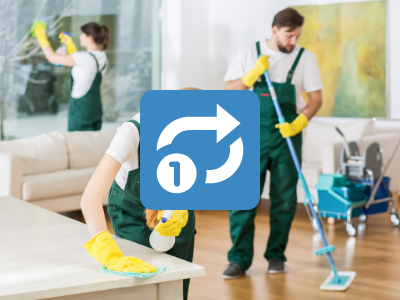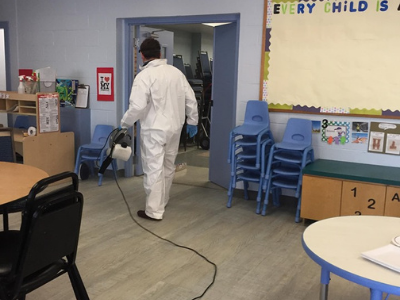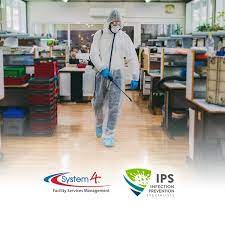Why Antimicrobial Coatings Are More Important Than You Think
.png)
With regard to health and sanitation, the pandemic of 2020, 2021 and 2022 has taught us a great deal. Antimicrobial coatings were one of the first topics to gain enormous attention. But what are they? Exactly how do they work? Is it worth using them?
Are they important? You bet.
Surfaces coated with antimicrobial coatings prevent bacteria from growing and spreading. Scientists have proven that they provide long-lasting protection against mold, fungi, and bacteria.

HISTORY OF ANTIMICROBIAL COATINGS
Microorganisms have been controlled by humans for centuries.
We desired to manipulate and suppress them well before COVID-19 became a problem. The Iliad and Odyssey, Homer's epic poems, mention sulfur's ability to kill fungi. In ancient Egypt, embalmers used spice-infused bandages to prevent mold from growing in their mummies. During the Middle Ages, the wealthy class used silver containers to store water and prevent bacteria from growing. By using silverware, they escaped the plague. The use of copper was sought after for its ability to sterilize water, cure headaches, and minimize skin conditions. For centuries, the Aztecs gargled with copper infused mouthwash to remove pathogens linked to sore throats.
For you wine connoisseurs, the 3:1:100 mixture of copper sulfate to calcium oxide to water was discovered in 1882 and is still used today to eliminate mildew on grapevines.
Today, antimicrobial coatings (AMCs) are used by a wide range of industries. There are five sectors paving the way to the future: healthcare, transportation, travel, office, and education. Many homeowners are also integrating these technologies into their homes.
WHAT ARE ANTIMICROBIAL COATINGS?
A microbe (microorganism) is anything that is small, microscopic, and alive. About 60% of the organic matter on our planet consists of microbes. That's 2-3 billion different species. They live inside you, in the air you breathe, and deep in the ocean and mountain caves. These microorganisms include bacteria, viruses, and fungi, among others.
Wine, yogurt, cheese, and pharmaceuticals such as antibiotics contain them. The human digestive system is full of them. Water treatment plants utilize them to break down toxic waste.
Influenza, food poisoning, and COVID-19 are pathogenic microbes.
As well as preventing the growth of fungi, mold, and bacteria, which are harmful to health and safety, AMCs minimize foul odors, stains, and degradation of the material on surfaces where they are applied. Surfaces that have been treated make it impossible for microorganisms to flourish.
Chuck Gerba, professor of environmental microbiology at University of Arizona, believes antimicrobial coatings will be the future of hygiene. One of Gerba’s studies highlighted a virus tracer that was seeded on a doorknob within an office of 100 employees. Within 4 hours, half the office space and half the employees were “infected” with the tracer. Applied to the "ground zero" doorknob, an AMC would have denatured the virus and rendered it incapable of infecting the rest of the office or staff.
AMCs have been shown to inhibit the growth of bacteria and mold for approximately 90 days. The coatings remain intact on the surface, providing protection between cleanings.
Infused with microbe resistant quaternary ammonium salts, copper, or silver, antimicrobial coatings are chemical agents. They are continuously working and are removed by harsh abrasion or wear and tear. You can find them in paints, solvents, and powders. Medical devices manufacturers have incorporated these coatings into catheters, surgical devices, medical electronics, instruments, etc. to minimize the risk of infection. In the food sector, AMCs have been added to food processing units, utensils, and containers. Athletic wear, surgical masks, wound dressings, and more contain AMCs.
GROWTH OF THE ANTIMICROBIAL COATINGS INDUSTRY
The pandemic has had an impact on the growth trajectory of the AMC industry, which is rapidly expanding. New research by Grand View Research Inc. estimates that the global antimicrobial coatings market will grow from 2.44 billion in 2014 to 21.5 billion by 2028.
Research firm MarketsandMarkets predicts that antimicrobial coatings will become a standard requirement in high traffic buildings in the future. Examples of such buildings would include healthcare facilities, schools, and office buildings.
Commercial, healthcare, mass transit, manufacturing, and consumer home goods all benefit from antimicrobial coatings. In addition, building materials, such as flooring, paints and walls, would greatly benefit from AMC integration.

BENEFITS OF ANTIMICROBIAL COATINGS
The use of strong cleansers and disinfectants to prevent the growth of bacteria and germs isn't always convenient. The better solution would be to apply a longer lasting surface coating.
Some global health authorities are suggesting proactive infection control measures be taken. They include stringent cleaning routines, hand-washing and intelligent surface disinfection protection.
Every 20 minutes, microbes will double in number on untreated surfaces. As a result, infections spread, unpleasant odors develop, stains develop, and products degrade. Once given a welcoming environment, microbes are hard to keep in check. Frequent cleaning is required. The growth rate of microbes is drastically reduced when a hostile environment is created.
Applying antimicrobial coatings reduces the need for constant disinfection, thereby minimizing harsh chemicals. In between professional applications of AMCs, soap and water can be used. Especially in schools where young children are present, fewer toxic chemicals would be beneficial.
The probability of infection spreading increases in places where there are a high number of people and high turnover rates. It's a short period of time for infection to spread in an office where human interaction is happening, based on the 100 employee study mentioned above. Adding antimicrobial coatings to high-volume touch points, such as railings, doorknobs, handles, switches, entrances, restrooms, common areas, and furniture, would increase cleanliness by decreasing bacteria and germs.
Antimicrobial coatings could minimize the number of disinfection treatments incorporated into daily and weekly cleanings. Every 90 days, public spaces such as theaters, gyms, classrooms, and medical offices are treated with AMCs.

WHAT DOES THE CDC SAY?
The CDC states that the virus that causes COVID-19 can land on surfaces. It’s possible for people to become infected if they touch those surfaces and then touch their eyes, nose or mouth.
If no one with confirmed or suspected COVID-19 has been in a space, cleaning once a day is usually enough to remove virus that may be on surfaces. This also helps maintain a healthy facility.
If a sick person or someone who tested positive for COVID-19 has been in your facility within the last 24 hours, you should clean AND disinfect the space.
Clean high-touch surfaces at least once a day or as often as determined necessary. Examples of high-touch surfaces include pens, counters, shopping carts, tables, doorknobs, light switches, handles, stair rails, elevator buttons, desks, keyboards, phones, toilets, faucets and sinks.

TAKEAWAY
As you develop a comprehensive cleaning, maintenance and disinfection plan for your facility, keep in mind the costs associated with maintaining a healthy, safe environment for your employees, customers, and visitors. Antimicrobial coatings can bolster your effectiveness by providing long-term protection, reducing microbe growth rates, and minimizing the need for harsh chemicals.
Lacking janitorial staffing
Concerned about a staffing shortage and whether you are using the right cleaning service for your workplace? It's not too late to find the perfect janitorial team that will keep your workplace clean and safe. Look for solid custodian referrals and consult with System4 IPS.
Which custodian or janitorial team is best for you? System4 IPS specializes in creating customized janitorial programs that meet the unique need of businesses like yours!
If your workplace experiences a singular COVID-19 positive case or outbreak, call System4 IPS and schedule your disinfection service today. Our professional team listens to your needs, requirements, and timing. See our many satisfied customer testimonials and public Google ratings.







.jpg)
.jpg)